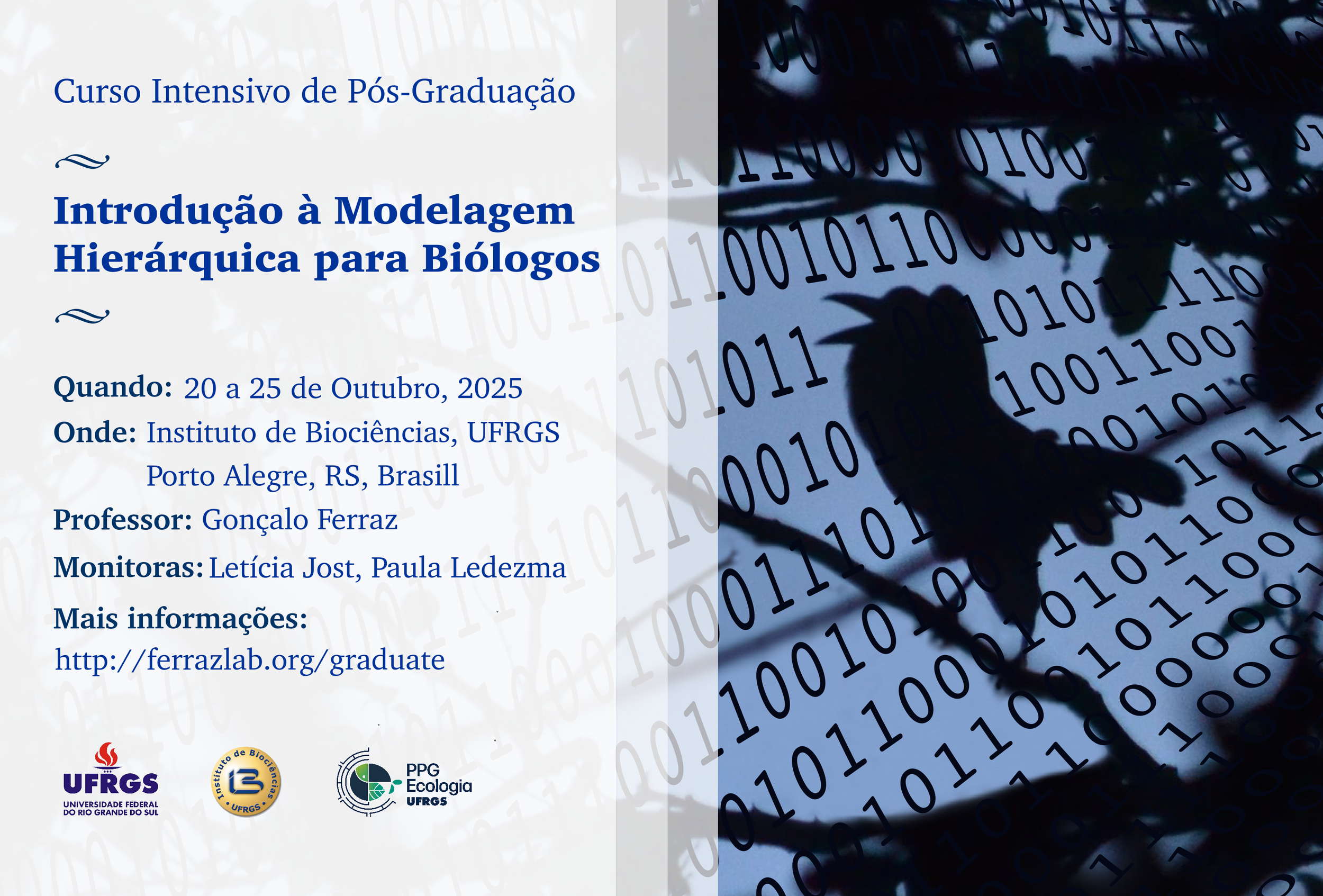Acontecerá de 20 a 25 de outubro de 2025 a oitava edição do curso de Introdução à Modelagem Hierárquica para Biólogos, do Programa de Pós-Graduação em Ecologia da Universidade Federal do Rio Grande do Sul (UFRGS). As atividades apresentadas pelo professor Gonçalo Ferraz, do Departamento de Ecologia da mesma universidade, terão lugar no Campus do Vale da UFRGS, em Porto Alegre, Rio Grande do Sul.
Como em edições anteriores, o curso apresentará fundamentos teóricos e contato introdutório com ferramentas de construção de modelos hierárquicos para a análise estatística de dados de campo em ecologia de populações e epidemiologia. O plano de trabalho se divide em aulas teóricas / discussão de leituras pela manhã e práticas de computador pela tarde. O conteúdo é orientado para pós-graduandos e profissionais das ciências biológicas, mas as inscrições estão abertas a qualquer pessoa com conhecimentos básicos de computação e interesse na análise estatística de populações, doenças infecciosas, comunidades, ou outros sistemas biológicos representáveis por um modelo linear generalizado com mais do que um nível de abstração.
O IMH 2025 será um curso intensivo com demanda relativamente alta por tempo de leitura e estudo—precisa dedicação exclusiva. Experimentando este ano um formato diferente do usual, a organização do curso não fornecerá alojamento nem alimentação para os estudantes. Desta forma, não será cobrada qualquer taxa para hospedagem e alimentação. No entanto, estudantes que venham de fora de Porto Alegre precisarão encontrar seu próprio alojamento assim como soluções de alimentação e transporte. O Campus do Vale da UFRGS é bem servido de transporte público e restaurantes. Mais próximo da data do curso colocaremos estudantes visitantes em contato com estudantes de Porto Alegre, para facilitar acesso a informação sobre habitação, alimentação e transporte. As aulas serão em português, mas o professor e monitora comunicam fluentemente em português, espanhol e inglês.
PARA SE CANDIDATAR: Abra, preencha e envie o formulário de candidatura abaixo. Em caso de dúvida, ou se não receber uma mensagem de confirmação do envio da candidatura em até 48 horas, entre em contato com goncalo.ferraz@ufrgs.br. Teremos 25 vagas para estudantes de qualquer instituição ou país de origem. Receberemos candidaturas até dia 10 de agosto, com resposta no máximo até dia 15 do mesmo mês. Estudantes de Programas de Pós-Graduação da UFRGS podem se matricular diretamente na secretaria do PPG-Ecologia da UFRGS. Estudantes de outras instituições serão encaminhados ao processo de matrícula após aceitação da candidatura.
INTRODUCTION TO HIERARCHiCAL modeling
(Austral) Fall, 25-student, 6-day intensive course, ECP00142, 3 Cr.
This intensive course is the empirical complement to the semester-long theoretical Population Ecology class on the right. The course provides a sampling-design and statistical modeling basis for obtaining estimates of population parameters that are essential for testing population dynamics theory. Students will study the foundations of hierarchical modeling and its applications to site-occupancy, capture-recapture and count data analysis. Course contents include an overview of the treatment of uncertainty in ecology, generalized linear modeling, and basic principles of maximum-likelihood and Bayesian data analysis. Students will learn to program simple R functions to analyze simulated data.
This class is not a pre-requisite but it is recommended to UFRGS students who will take 'Population Ecology'. Both classes require R programing but this one contains more programing basics—if you want to take both, start with Hierarchical Modeling. If you are at UFRGS, it is also a very good idea—though not at all a requirement— to take Prof. Pablo Inchausti's Métodos Estatísticos Avançados em Ecologia e Evolução (ECP00140)—before taking this class. You can perfectly well take this class on its own too, and we welcome students from other schools in Brazil our abroad.
Note: Currently the formal Portuguese name of this class at UFRGS is Introdução à Modelagem Hierárquica.
Population Ecology
25-30 students, (Austral) Spring semester, ECP0055, 3 Cr.
This class offers an overview of the theoretical foundations of population dynamics. The course opens with a presentation of exponential growth and its simplifying assumptions as a null model of ecological population dynamics. Subsequently, we withdraw the assumptions one by one to study stochasticity, density-dependence, interspecific interactions, age-structure and spatial structure as they affect the demography of wild animal and plant populations (syllabus). Every topic will include readings of classic and contemporary papers, as well as an R practicum where students will implement numerical simulations of the population models.
This class has been offered 25 times to more than 600 students at INPA, USP, UFRJ, UFMT, and UFRGS. The contents have changed since the first edition, at INPA, in 2004, but there's been a consistent emphasis on the formulation of theoretical ideas that can be tested under the empirical approach taught in the companion 'Introduction to Hierarchical Modeling'.
Graduate Student mentorship
Graduate training at the Ferraz lab emphasizes quantitative reasoning, critical thinking, and breadth of understanding. Students are challenged to present their ideas in a mathematical framework, to question every scientific statement and to approach their research problems from a variety of perspectives. Ongoing lab projects develop along the three lines of research on 1) Amazon bird population responses to landscape change; 2) distribution and demography of threatened species; and 3) population biology of infectious diseases. Students with research interests outside the scope of ongoing work are encouraged to develop original projects, conditional on funding availability. Prospective students are welcome to visit the lab in Porto Alegre, or send email with questions. If you know what you want from graduate school and think that this lab is the right place for you, write a personal statement and send it to Gonçalo's Email.

